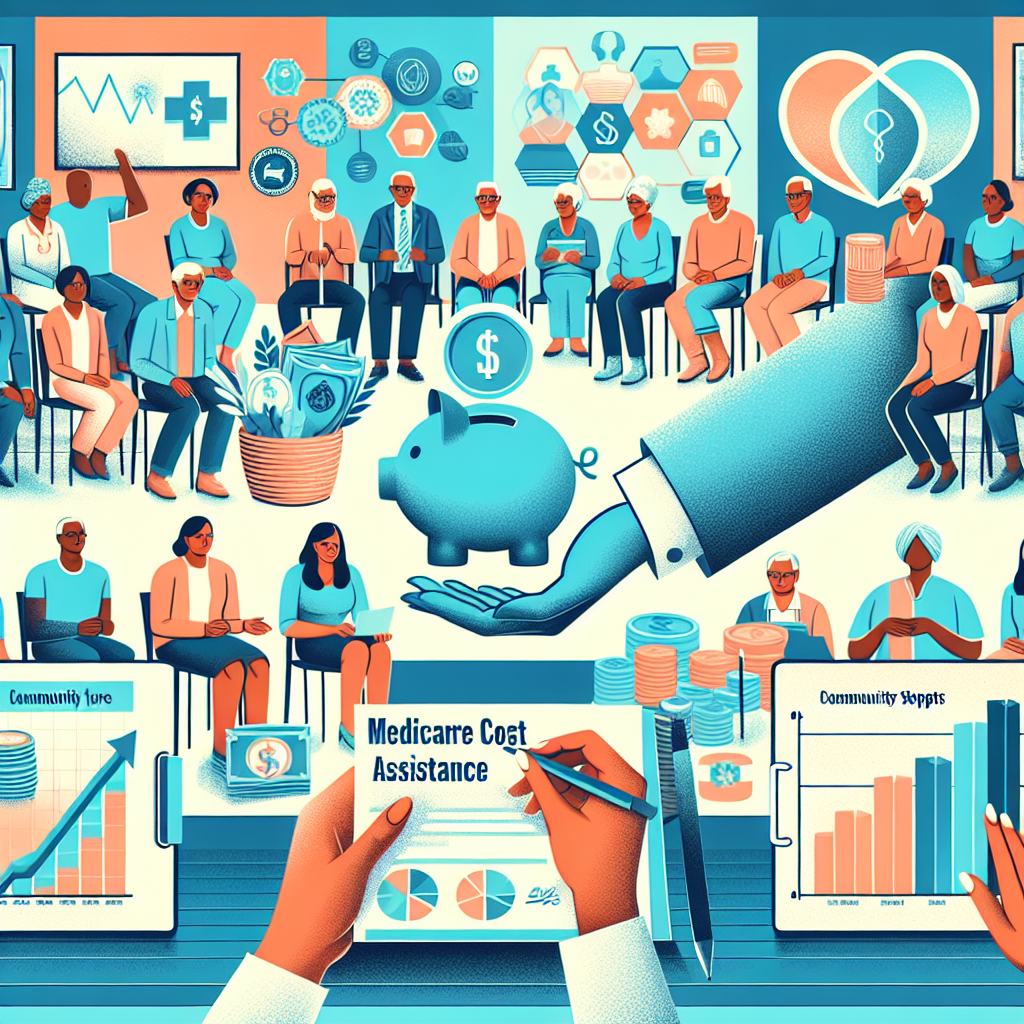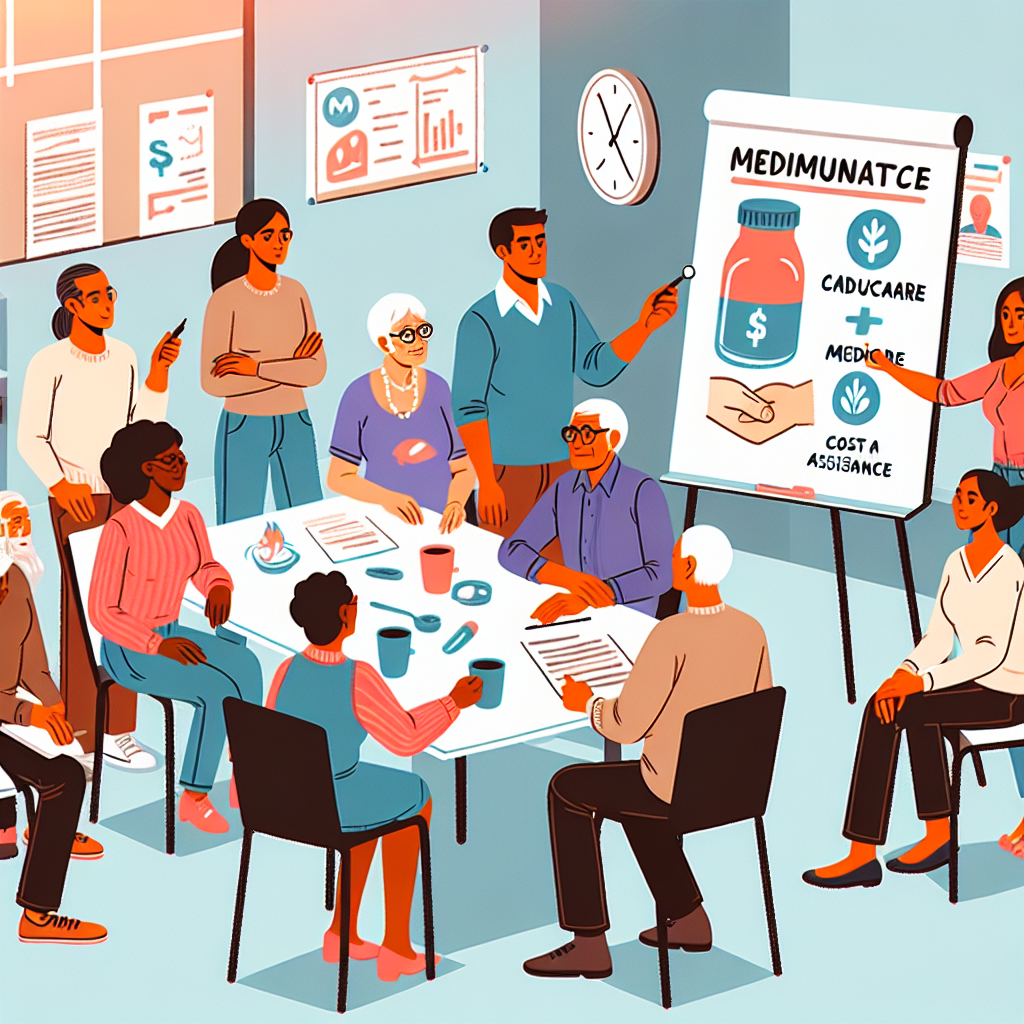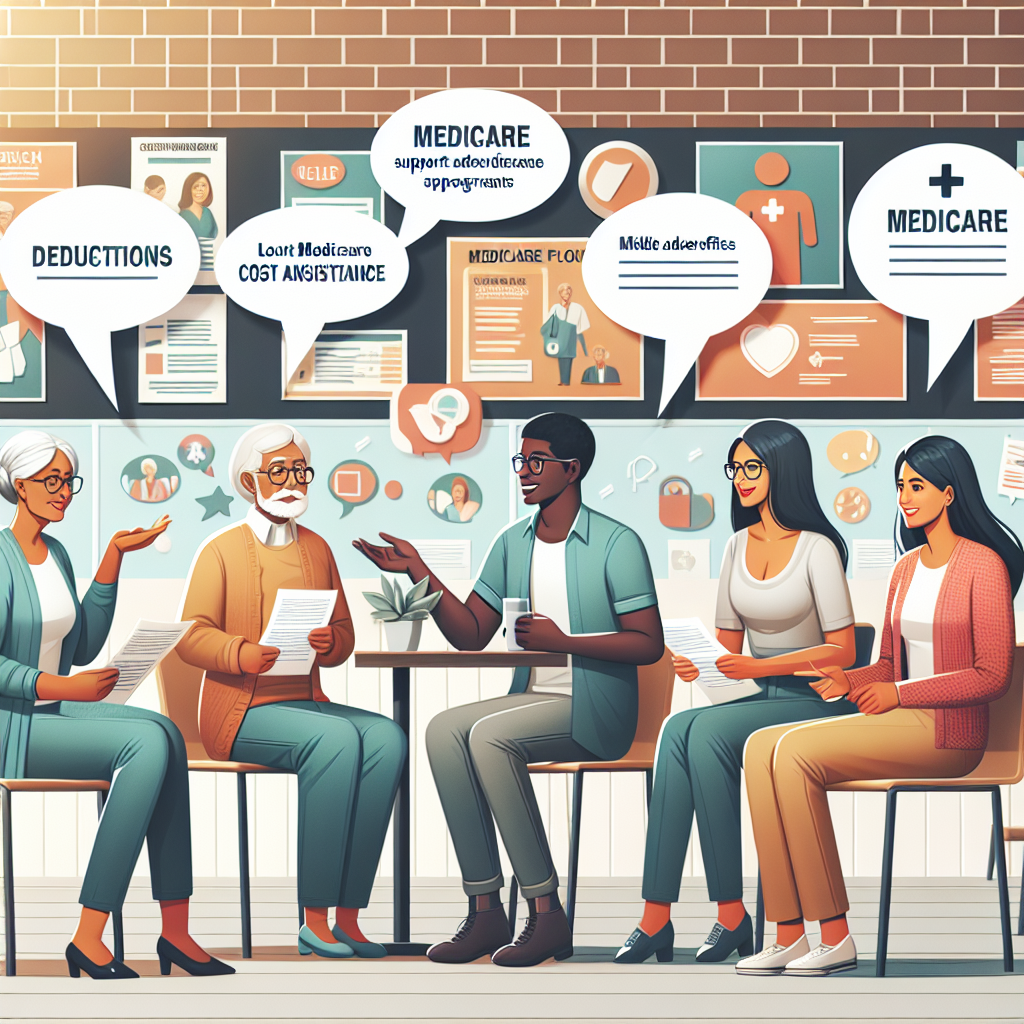Medicare cost assistance is a critical need for many individuals seeking healthcare coverage, and community support can play a significant role in making this aid accessible. By exploring the impact of communal assistance on Medicare expenses, we can uncover the invaluable ways in which local resources and services can lighten the financial burden for those in need. From charitable organizations offering financial aid to volunteer-run clinics providing medical services at no cost, the supportive network within communities can truly make a difference in ensuring equitable access to healthcare for all. Join us on a journey to discover the transformative power of community support on Medicare cost assistance.
Understanding Medicare Cost Assistance

Medicare, a federal health insurance program in the United States, plays a crucial role in providing healthcare coverage for individuals aged 65 and older, as well as certain younger individuals with disabilities. However, despite its extensive coverage, many beneficiaries still face financial challenges in meeting the costs associated with their healthcare needs. This is where Medicare cost assistance programs come into play, aiming to provide support to individuals in need.
Overview of Medicare and its coverage
Medicare is comprised of different parts, each covering specific services:
– Part A: Hospital insurance that helps cover inpatient care, skilled nursing facility care, hospice care, and home healthcare.
– Part B: Medical insurance that helps cover services from doctors and other healthcare providers, outpatient care, home healthcare, durable medical equipment, and preventive services.
– Part C: Also known as Medicare Advantage, these plans are offered by private companies approved by Medicare and include Part A, Part B, and often Part D prescription drug coverage.
– Part D: Prescription drug coverage that helps cover the cost of prescription medications.
The importance of Medicare cost assistance for individuals
Medicare cost assistance programs are essential for many beneficiaries due to the following reasons:
– Financial constraints: Healthcare costs can be burdensome for individuals, especially those living on fixed incomes or facing medical emergencies.
– Coverage gaps: Medicare may not cover all healthcare services, leading to out-of-pocket expenses that can be challenging for beneficiaries to afford.
– Prescription drug costs: Part D coverage can still leave beneficiaries with high drug costs, making assistance programs vital for accessing necessary medications.
– Chronic conditions: Individuals with chronic illnesses often require ongoing care and medications, leading to significant healthcare expenses that can strain their finances.
Common challenges faced by Medicare beneficiaries in covering healthcare costs
Despite Medicare’s coverage, beneficiaries encounter several challenges in meeting healthcare costs:
– Deductibles and copayments: Even with Medicare coverage, out-of-pocket costs such as deductibles and copayments can add up, especially for individuals with frequent medical needs.
– Limited coverage: Certain services, like dental, vision, and hearing care, are not covered by traditional Medicare, leaving beneficiaries to cover these costs on their own.
– Income limitations: Some beneficiaries may have limited income, making it difficult to afford healthcare services even with Medicare coverage.
– Complexity of the healthcare system: Navigating Medicare plans, coverage options, and cost structures can be overwhelming for beneficiaries, leading to potential gaps in coverage and unexpected expenses.
Types of Medicare Cost Assistance Programs
- Medicare Savings Programs
- Medicare Savings Programs (MSPs) are state programs that assist individuals with limited income and resources in paying for Medicare premiums, deductibles, coinsurance, and copayments.
- There are different levels of MSPs based on income and asset criteria, such as the Qualified Medicare Beneficiary (QMB) Program, Specified Low-Income Medicare Beneficiary (SLMB) Program, and Qualifying Individual (QI) Program.
- Eligibility requirements and benefits vary by state, but these programs play a crucial role in providing financial assistance to beneficiaries who would otherwise struggle to afford their healthcare costs.
- Extra Help (Low-Income Subsidy)
- Extra Help, also known as the Low-Income Subsidy (LIS) program, is a federal program that helps Medicare beneficiaries with limited income and resources pay for prescription drug costs associated with Medicare Part D.
- Qualifying for Extra Help can significantly reduce or eliminate out-of-pocket expenses related to prescription medications, including premiums, deductibles, and co-payments.
- The program aims to ensure that low-income beneficiaries have access to necessary medications without facing financial hardship, thus promoting better health outcomes and medication adherence.
- State Pharmaceutical Assistance Programs (SPAPs)
- State Pharmaceutical Assistance Programs (SPAPs) are state-run initiatives that provide additional assistance to Medicare beneficiaries for their prescription drug expenses.
- These programs vary by state in terms of eligibility criteria, covered medications, and cost-sharing arrangements, but they generally help fill the gaps in coverage left by Medicare Part D.
- SPAPs serve as a valuable resource for beneficiaries who may not qualify for other assistance programs but still require help with affording their prescription drugs, ultimately contributing to better medication adherence and overall health management.

The Role of Community Support in Medicare Cost Assistance
Community support plays a crucial role in providing assistance with Medicare costs, particularly for vulnerable populations who may struggle to afford necessary healthcare services.
- Importance of community support for vulnerable populations
Community support is essential for vulnerable populations, such as low-income individuals, seniors, and individuals with disabilities, who often face financial barriers to accessing Medicare coverage. Without adequate support, these individuals may be unable to afford premiums, deductibles, or copayments, leading to gaps in healthcare coverage and potentially worse health outcomes.
- Initiatives and organizations offering assistance with Medicare costs
Various initiatives and organizations exist to provide assistance with Medicare costs. These include non-profit organizations, community health centers, local government programs, and volunteer groups that offer guidance on Medicare options, help with applications, and even financial assistance to cover out-of-pocket expenses for eligible individuals.
- Benefits of community support in navigating Medicare options
Community support can greatly benefit individuals in navigating the complex landscape of Medicare options. By providing personalized assistance and resources, community support services can help individuals understand their coverage choices, compare plans, and enroll in programs that best meet their healthcare needs and financial circumstances. This support can ultimately lead to better access to care, improved health outcomes, and reduced overall healthcare costs for both individuals and the healthcare system.
Community support plays a vital role in assisting vulnerable populations with Medicare costs, showcasing the importance of collaborative efforts between community organizations and beneficiaries to navigate the complexities of healthcare coverage. Strengthening community support through outreach campaigns, coordination with healthcare providers, advocating for policy changes, and empowering beneficiaries with knowledge and support can enhance access to essential Medicare cost assistance programs.
Collaborative Efforts between Community Organizations and Medicare Beneficiaries
Community organizations play a crucial role in facilitating Medicare cost assistance for beneficiaries through various collaborative efforts. These initiatives aim to provide tailored support and guidance to individuals navigating the complexities of the Medicare system. By working closely with community organizations, Medicare beneficiaries can access a range of services and resources to help them make informed decisions regarding their healthcare coverage.
- Workshops and Educational Sessions on Medicare
Community organizations often organize workshops and educational sessions focused on Medicare. These sessions cover topics such as the different parts of Medicare, eligibility requirements, coverage options, and enrollment deadlines. By participating in these workshops, beneficiaries can enhance their understanding of the program and make well-informed decisions when selecting a plan that best suits their needs.
- One-on-One Assistance with Enrollment and Plan Selection
Community organizations offer personalized assistance to Medicare beneficiaries during the enrollment process. Trained volunteers or staff members provide one-on-one support to help individuals navigate the enrollment forms, understand plan options, and compare coverage benefits. This personalized assistance ensures that beneficiaries are able to make choices that align with their healthcare needs and financial circumstances.
- Referral Services to Other Support Programs and Resources

In addition to direct assistance with Medicare enrollment, community organizations also offer referral services to other support programs and resources that can benefit beneficiaries. These may include programs that help cover prescription drug costs, home healthcare services, or assistance with out-of-pocket expenses. By connecting beneficiaries to these additional resources, community organizations contribute to improving overall health outcomes and reducing financial burdens for Medicare recipients.
Addressing Misconceptions about Medicare Cost Assistance
Misconceptions surrounding Medicare cost assistance can often deter eligible individuals from seeking the support they need. By addressing and debunking these misconceptions, more people can benefit from the available assistance programs. Here are some key points to consider:
- Clarifying Eligibility Criteria for Assistance Programs:
- Many individuals are unaware of the specific eligibility criteria for Medicare cost assistance programs. By providing clear guidelines on who qualifies for these programs, more eligible individuals can access the support they need.
- It is crucial to outline the various factors that determine eligibility, such as income level, age, disability status, and specific medical needs. Dispelling any confusion about these criteria can encourage more individuals to apply for assistance.
- Dispelling Myths about the Application Process:
- One common misconception is that the application process for Medicare cost assistance is complex and time-consuming. In reality, many assistance programs have streamlined application procedures to make it easier for individuals to apply.
- By debunking the myth that the application process is daunting, more people may be willing to seek assistance. Providing step-by-step guidance on how to apply can help demystify the process and encourage eligible individuals to take advantage of available support.
- Providing Accurate Information on Available Resources:
- Another misconception is that there are limited resources available for Medicare cost assistance. In reality, there are various programs and initiatives at the community level that can provide financial support for healthcare costs.
- By disseminating accurate information about the range of resources available, individuals can explore different options for Medicare cost assistance. Highlighting the variety of programs can help individuals find the support that best fits their needs and circumstances.
Identifying Gaps in Community Support for Medicare Beneficiaries
Geographical Disparities in Access to Support Services
- Rural vs. Urban Disparities: Medicare beneficiaries in rural areas often face challenges in accessing adequate community support services due to limited healthcare infrastructure and resources. This lack of proximity to healthcare facilities can result in delayed or insufficient assistance with Medicare costs.
- Transportation Barriers: Geographical distances can pose significant obstacles for elderly or disabled individuals in reaching community support centers for Medicare cost assistance. Limited public transportation options further exacerbate this issue, leading to decreased utilization of available services.
Cultural and Linguistic Barriers Affecting Assistance Utilization
- Language Barriers: Non-English speaking Medicare beneficiaries encounter difficulties in understanding and navigating the complex system of Medicare cost assistance due to a lack of language-appropriate resources. This hinders their ability to fully benefit from community support programs tailored to their needs.
- Cultural Sensitivity: Insufficient cultural competence among support service providers can impede effective communication and trust-building with diverse Medicare populations. Cultural insensitivity may deter individuals from seeking assistance, exacerbating disparities in accessing Medicare cost support.
Challenges for Marginalized Communities in Accessing Medicare Cost Assistance
- Socioeconomic Barriers: Low-income Medicare beneficiaries often face financial constraints that limit their ability to cover out-of-pocket costs, despite the availability of community support services. This financial strain can deter marginalized communities from seeking assistance, perpetuating disparities in healthcare access and affordability.
- Health Disparities: Certain marginalized populations, such as racial or ethnic minorities, may experience higher rates of chronic conditions requiring costly medical treatments. The intersection of health disparities and limited access to Medicare cost assistance further marginalizes these communities, highlighting the urgent need for targeted support interventions.
Strategies for Strengthening Community Support for Medicare Beneficiaries
Enhancing Outreach and Awareness Campaigns
- Conduct targeted educational campaigns to inform Medicare beneficiaries about available cost assistance programs.
- Collaborate with local community centers, senior centers, and healthcare facilities to host informational sessions.
- Utilize social media platforms and local newspapers to spread awareness about Medicare cost assistance options.
- Offer multilingual resources to reach diverse populations within the community.
- Provide personalized assistance to help beneficiaries navigate the application process for cost assistance programs.
Improving Coordination Between Community Organizations and Healthcare Providers
- Establish formal partnerships between community organizations, hospitals, and clinics to streamline support services for Medicare beneficiaries.
- Develop referral systems to ensure seamless communication and coordination between healthcare providers and community support agencies.
- Implement training programs for healthcare professionals to enhance their understanding of available Medicare cost assistance programs.
- Organize joint events and workshops where community organizations and healthcare providers can collaborate to address the needs of Medicare beneficiaries.
- Create shared databases or platforms to track the utilization of cost assistance programs and identify areas for improvement in service delivery.
Advocating for Policy Changes to Expand Assistance Programs
- Engage with local policymakers and legislators to advocate for increased funding for Medicare cost assistance programs.
- Collaborate with advocacy groups to raise awareness about the importance of expanding access to affordable healthcare for Medicare beneficiaries.
- Support initiatives that aim to simplify the application process for cost assistance programs and reduce administrative barriers.
- Lobby for policy changes that address gaps in coverage and ensure that all eligible beneficiaries can access the support they need.
- Monitor legislative developments and actively participate in public hearings or town hall meetings to voice the concerns of Medicare beneficiaries regarding cost assistance programs.
Empowering Medicare Beneficiaries through Knowledge and Support
Empowering Medicare beneficiaries through knowledge and support is a crucial strategy in enhancing their understanding of the healthcare system and maximizing the benefits available to them. By equipping beneficiaries with the necessary information and resources, they can make informed decisions regarding their healthcare needs, leading to better health outcomes and potentially reducing Medicare costs in the long run.
- Promoting self-advocacy and empowerment in navigating Medicare
Encouraging beneficiaries to become advocates for their own healthcare needs can foster a sense of independence and control over their medical choices. Providing educational materials on Medicare coverage options, rights, and responsibilities empowers beneficiaries to actively engage with their healthcare providers, ask pertinent questions, and make decisions that align with their preferences and financial circumstances.
- Encouraging peer support networks for sharing experiences and information
Peer support networks play a vital role in connecting Medicare beneficiaries with others facing similar challenges and experiences. By facilitating peer support groups or online forums, beneficiaries can exchange valuable insights, tips, and resources related to navigating Medicare, managing healthcare costs, and accessing community support services. These interactions not only provide emotional support but also practical guidance on how to optimize Medicare benefits and access cost assistance programs.
- Fostering a sense of community and solidarity among Medicare beneficiaries
Creating a sense of community among Medicare beneficiaries can help combat feelings of isolation and uncertainty often associated with navigating the complexities of the healthcare system. Community events, workshops, or support groups specifically tailored to Medicare beneficiaries can foster connections, promote social engagement, and instill a sense of solidarity. By building strong community bonds, beneficiaries can collectively advocate for improved Medicare policies, share best practices for cost-saving strategies, and access local resources that support their overall well-being.
FAQs for Exploring the Impact of Community Support on Medicare Cost Assistance
What is Medicare cost assistance community support?
Medicare cost assistance community support refers to various programs, services, and resources provided by community organizations to help individuals with limited income cover their Medicare expenses. These support systems can include financial assistance, counseling, and other forms of aid to ensure that individuals can afford necessary medical care under the Medicare program.
How can community support impact Medicare cost assistance?
Community support can have a significant impact on Medicare cost assistance by providing additional resources and support to individuals who may be struggling to cover their healthcare expenses. This assistance can help individuals access necessary medical treatments, medications, and other services that may otherwise be unaffordable. By offering financial assistance and educational resources, community support can also help individuals navigate the complexities of the Medicare program and ensure they are receiving all the benefits to which they are entitled.
What types of community support are available for Medicare cost assistance?
There are various types of community support available for Medicare cost assistance, including financial assistance programs, counseling services, support groups, and outreach programs. These resources may be provided by local organizations, non-profit agencies, healthcare providers, or government agencies. Some communities may also offer specific programs tailored to seniors, individuals with disabilities, or other populations in need of Medicare cost assistance.
How can individuals access community support for Medicare cost assistance?
Individuals can access community support for Medicare cost assistance by contacting local organizations, healthcare providers, or government agencies that offer assistance programs. Some resources may require individuals to meet certain eligibility criteria, while others may be available to all individuals in need of support. It is important for individuals to research the available resources in their community and reach out for assistance when needed.